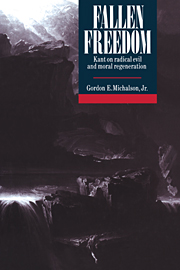3 - “This evil is radical…”
Published online by Cambridge University Press: 15 December 2009
Summary
What comes out of the mouth proceeds from the heart, and this defiles a man.
Matthew 15:18Radical evil and the disposition
The cumbersome terminological scaffolding that stands in the background of Kant's view of radical evil can be misleading. It can create the impression that the theory of radical evil is a somewhat isolated and highly technical component within Kant's total ethical theory, a component that Kant momentarily sets off for special attention to fill out a picture potentially left incomplete by the Foundations of the Metaphysics of Morals and the Critique of Practical Reason. But the theory of radical evil is not a corrective to the earlier ethical writings, but a crucial part of Kant's larger vision of the creation of a moral universe. As I have been suggesting, Kant envisions reality as a meaningful arena of human–divine cooperation in the creation of a morally good universe. Insofar as moral evil is a threat to the realization of this universe, it is a threat to the very meaning of life; even more, then, will an evil that is radical exist as a threat. Consequently, however cumbersome his account of this issue may be, the account is absolutely central to Kant's effort to define and justify his most comprehensive vision of the destiny of rational beings.
We have seen that Kant means by moral evil the subordination, within a maxim, of the incentive of moral duty to the incentive of sensuous inclination, or self-love.
- Type
- Chapter
- Information
- Fallen FreedomKant on Radical Evil and Moral Regeneration, pp. 52 - 70Publisher: Cambridge University PressPrint publication year: 1990



